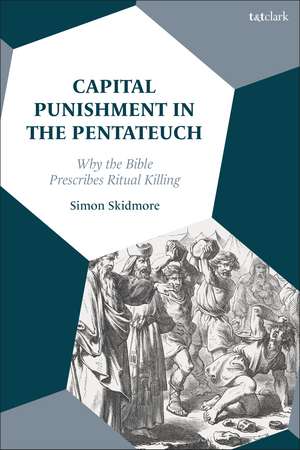Capital Punishment in the Pentateuch: Why the Bible Prescribes Ritual Killing
Autor Dr Simon Skidmoreen Limba Engleză Paperback – 29 mai 2024
| Toate formatele și edițiile | Preț | Express |
|---|---|---|
| Paperback (1) | 191.13 lei 6-8 săpt. | |
| Bloomsbury Publishing – 29 mai 2024 | 191.13 lei 6-8 săpt. | |
| Hardback (1) | 510.42 lei 6-8 săpt. | |
| Bloomsbury Publishing – 14 dec 2022 | 510.42 lei 6-8 săpt. |
Preț: 191.13 lei
Preț vechi: 249.26 lei
-23% Nou
Puncte Express: 287
Preț estimativ în valută:
36.58€ • 37.97$ • 30.50£
36.58€ • 37.97$ • 30.50£
Carte tipărită la comandă
Livrare economică 22 martie-05 aprilie
Preluare comenzi: 021 569.72.76
Specificații
ISBN-13: 9780567707239
ISBN-10: 0567707237
Pagini: 232
Dimensiuni: 156 x 234 x 25 mm
Greutate: 0.33 kg
Editura: Bloomsbury Publishing
Colecția T&T Clark
Locul publicării:London, United Kingdom
ISBN-10: 0567707237
Pagini: 232
Dimensiuni: 156 x 234 x 25 mm
Greutate: 0.33 kg
Editura: Bloomsbury Publishing
Colecția T&T Clark
Locul publicării:London, United Kingdom
Caracteristici
Resolves the theological tension between divinely sanctioned killing and Judeo-Christian belief that all humans are created in the image of God
Notă biografică
Simon Skidmore studied for his PhD at the University of Queensland and teaches religion in the school system in Brisbane, Australia.
Cuprins
AcknowledgementsIntroduction1. Imago Dei and Human Immolation 2. Method 3. The Blasphemer of Leviticus 24:10-23 4. The Sabbath-gatherer of Numbers 15:32-36 5. Homicide in the Pentateuch 6. The Management of Mimetic Rivalry in Leviticus 18 and 20 7. Sexual Offences and Mimetic Rivalry in Deuteronomy 22:13-29 8. The Rebellious Son of Deuteronomy 21:18-21 9. ConclusionBibliographyIndex
Recenzii
Simon Skidmore's book provides a fresh reading of ritual killings in the Pentateuch. A careful application of René Girard's mimetic theory allows him to offer a more satisfying and a more robust reading of key passages in this part of the Bible than may be offered by alternative approaches. Human immolations are the outcome of a controlled release of violence to overcome mimetic rivalries, draw the community together and restore peace and order. The most important part of this book shows the illegitimate use of biblical texts by authors that try to justify capital punishment in today's USA. Skidmore also mentions what future research may investigate in continuation of his own approach.
Arguing that 'prescribed ritual killings' vent mimetic rivalry on a scapegoat, restoring peace and securing a community's core identity as 'image-bearers of God,' Skidmore compellingly demonstrates the analytic power of René Girard's theory applied to capital crimes. Writing with exceptional clarity and highly nuanced attention to a full range of extant scholarship, Skidmore unifies disparate texts, thereby accounting for inconsistencies, conundrums, and tensions other scholars deem irresolvable. As readers ask, 'How will he explain THIS one?' Capital Punishment in the Pentateuch becomes a page-turner. Of special salience: a critique of these texts' deployment in support of state-sanctioned executions. A notable achievement.
Arguing that 'prescribed ritual killings' vent mimetic rivalry on a scapegoat, restoring peace and securing a community's core identity as 'image-bearers of God,' Skidmore compellingly demonstrates the analytic power of René Girard's theory applied to capital crimes. Writing with exceptional clarity and highly nuanced attention to a full range of extant scholarship, Skidmore unifies disparate texts, thereby accounting for inconsistencies, conundrums, and tensions other scholars deem irresolvable. As readers ask, 'How will he explain THIS one?' Capital Punishment in the Pentateuch becomes a page-turner. Of special salience: a critique of these texts' deployment in support of state-sanctioned executions. A notable achievement.
